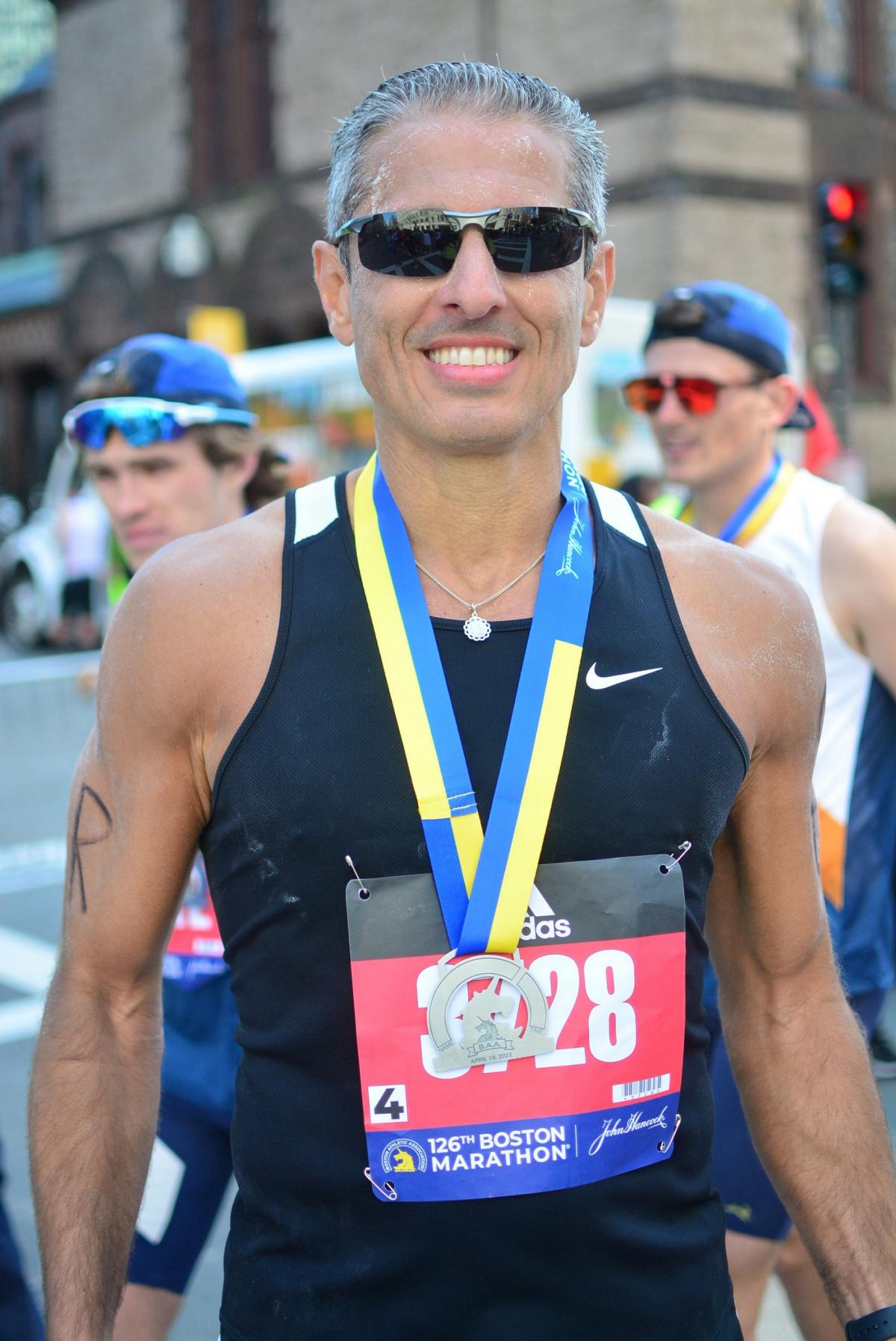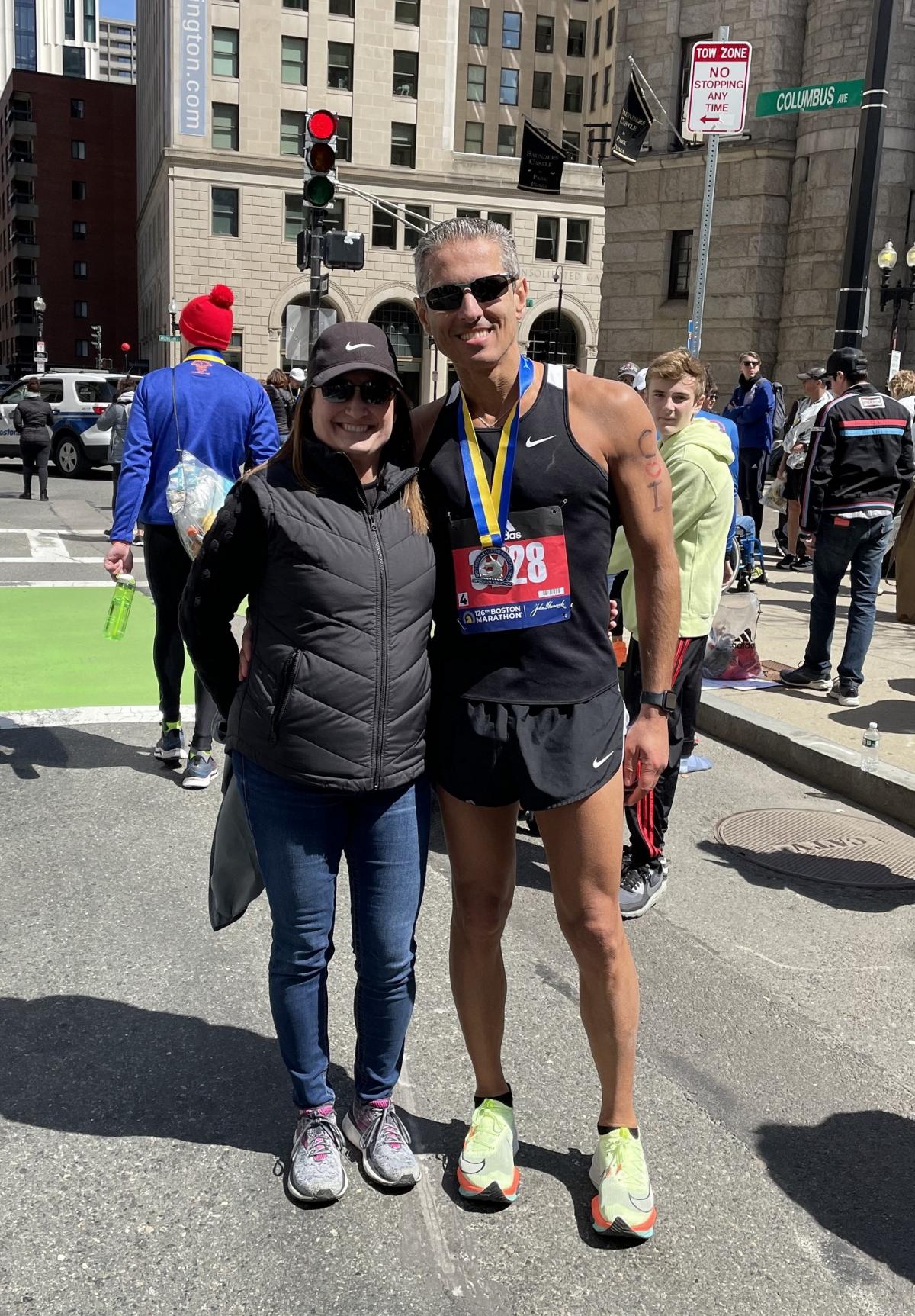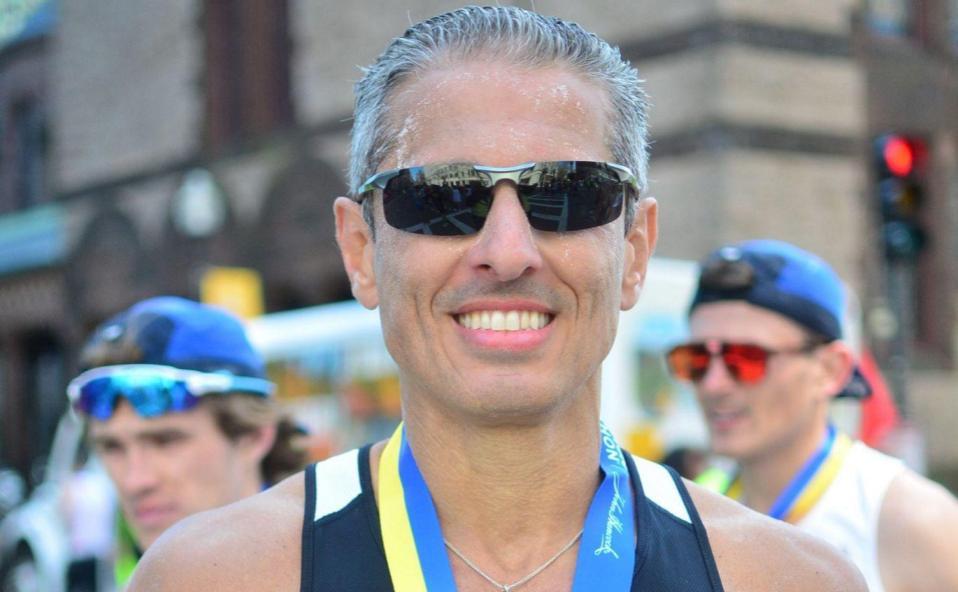
UM SRH neurosurgeon Khalid Kurtom, MD, is shown at the finish line of the Boston Marathon on April 18, 2022.
Khalid Kurtom, MD spent his 44th birthday – at least 3 hours and 28 seconds of it – on the road from the town of Hopkinton, Massachusetts to Boston.
But Kurtom was not behind the wheel – he took a few days off from his role as a neurosurgeon and medical director at the University of Maryland Shore Medical Center in Easton to spend a long weekend in Boston among more than 25,000 competitors running the 126th Boston Marathon on April 18. Kurtom was joined in Boston by his 11-year old son and 9-year old daughter, and together they enjoyed a few days touring the city’s museums, parks and historic sites before the marathon.
“This didn’t leave much time for preparing for the race with the best nutrition and stretching, but we’d never been to Boston before and there is so much there to see and do,” said Dr. Kurtom. “We saw so many sights in just a few days. I tried to enjoy every moment with my kids and share this experience with them.”
A resident of the Talbot County town of Trappe, Dr. Kurtom’s journey to running the Boston Marathon – named one of the top six marathons in the world by sportstourismnews.com – began in the early weeks of the COVID-19 pandemic.
“I was never a long-distance runner, but when the pandemic started, I saw an opportunity to maintain a high level of physical activity by establishing running a marathon as my goal, which seemed like an unachievable goal to me but one worth pursuing,” Dr. Kurtom said. “Before, I ran only a few miles at time, but I started increasing the distance, working up to 50 or 60 miles a week as well as continuing strength training at the gym. Along the way, I also learned so much about health, nutrition, and exercise – to me, that journey is the most important part of the whole experience.”

Shown with Dr. Kurtom after the race is his colleague Wendy Towers, CRNP. Towers and her husband traveled to Boston to be on hand for the event.
He ran a few half marathons first and then in April 2021, entered the Tidewater Striders Spring Marathon in Chesapeake, Virginia, which is a Boston Marathon qualifier. Coming in third overall among 71 racers, Kurtom clocked in at 2:54:55, qualifying him to compete in the Boston event.
In addition to his children, on hand for the event were Dr. Kurtom’s colleague, Wendy Towers, CRNP, UM Shore Medical Group, who with her husband, Cooper, enjoyed a visit with their daughter who lives in Boston. “When Dr. Kurtom qualified for the Boston Marathon last year, I was so excited, I promised to be there,” said Towers. “I offered as much support and encouragement as possible throughout his year of training, so it was great to be there to cheer him on.”
“Because of the terrain, the Boston Marathon is much harder than many other races — it takes a lot of mental and emotional preparation as well as physical preparation, it is designed to break the most accomplished runners,” Dr. Kurtom said. “The hardest stretch is from mile 17 to 21, which has four, mile-long uphill climbs. The last one is called ‘heartbreak hill’ because that is where a lot of runners break down.”
Dr. Kurtom’s determination and training paid off – he finished in 3 hours and 28 seconds, within the top 13 percent of finishers and placing 536thin his age group. But he’s quick to give credit to others who supported his journey, including his family, his colleagues at UM Shore Regional Health and his patients.
“I got so much support, so much encouragement – especially from my neurosurgery team members who had a close-up view of my training schedule, which included lunchtime runs from the office as well as late night runs,” he said. “One of many things I learned from the experience is that time is relative, you make time for things that are important to you. When I encourage my patients to improve their fitness level, I tell them if I can find the time to work on fitness in my busy schedule, I know you can, too.’”
“This is really another monumental achievement for Dr. Kurtom,” said his friend and colleague, Christopher Runz, MD. “His mindset, skills and voracious work effort make him world class in everything he does. He really is a motivating force and an inspiration to all of us.”
With the marathon behind him, finding free time is likely to be less challenging for Kurtom; while all over the U.S., there are many marathons that offer better weather, easier terrain and nicer vistas than Boston, he plans to return to a more moderate, more well-rounded fitness routine.
“I was honored to be running alongside so many really accomplished, elite runners who travel the world competing in marathons. It was an amazing diversity of people, and I am so glad I had that experience,” he said. “I also hope that my story inspires others to take up some kind of physical activity that will benefit their overall health and fitness, to set a goal, and keep fighting to reach it.”
“We congratulate and celebrate Dr. Kurtom’s success at this year’s Boston Marathon,” said Ken Kozel, President and CEO of UM Shore Regional Health. “He has proven that setting what seem as unattainable goals can be accomplished with hard work, perseverance and determination.”
About University of Maryland Shore Regional Health
As part of the University of Maryland Medical System (UMMS), University of Maryland Shore Regional Health is the principal provider of comprehensive health care services for more than 170,000 residents of Caroline, Dorchester, Kent, Queen Anne’s and Talbot counties on Maryland’s Eastern Shore. UM Shore Regional Health’s team of more than 2,200 employees, medical staff, board members and volunteers works with various community partners to fulfill the organization’s mission of Creating Healthier Communities Together.
About the University of Maryland Medical System
The University of Maryland Medical System (UMMS) is a university-based regional health care system focused on serving the health care needs of Maryland, bringing innovation, discovery and research to the care we provide and educating the state’s future physician and health care professionals through our partnership with the University of Maryland School of Medicine and University of Maryland, Baltimore professional schools (Nursing, Pharmacy, Social Work and Dentistry) in Baltimore. As one of the largest private employers in the State, the health system’s more than 29,500 employees and 4,000 affiliated physicians provide primary and specialty care in more than 150 locations, including 12 hospitals and 9 University of Maryland Urgent Care centers. The UMMS flagship academic campus, the University of Maryland Medical Center in downtown Baltimore, is recognized regionally and nationally for excellence and innovation in specialized care. Our acute care and specialty rehabilitation hospitals serve urban, suburban and rural communities and are located in 13 counties across the State. For more information, visit www.umms.org.



Write a Letter to the Editor on this Article
We encourage readers to offer their point of view on this article by submitting the following form. Editing is sometimes necessary and is done at the discretion of the editorial staff.